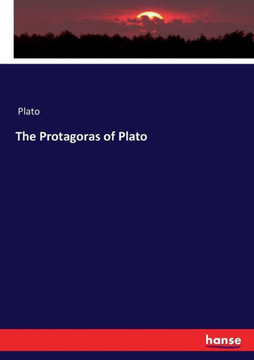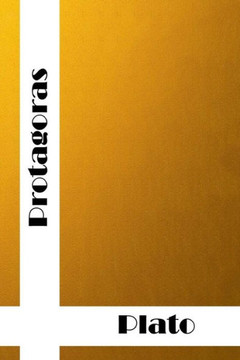
Createspace Independent Publishing Platform
Protagoras (Oeuvres De Plato)
Product Code:
9781543265606
ISBN13:
9781543265606
Condition:
New
$11.18

Protagoras (Oeuvres De Plato)
$11.18
The Protagoras, like several of the Dialogues of Plato, is put into the mouth of Socrates, who describes a conversation which had taken place between himself and the great Sophist at the house of Callias-'the man who had spent more upon the Sophists than all the rest of the world'-and in which the learned Hippias and the grammarian Prodicus had also shared, as well as Alcibiades and Critias, both of whom said a few words-in the presence of a distinguished company consisting of disciples of Protagoras and of leading Athenians belonging to the Socratic circle. The dialogue commences with a request on the part of Hippocrates that Socrates would introduce him to the celebrated teacher. He has come before the dawn had risen-so fervid is his zeal. Socrates moderates his excitement and advises him to find out 'what Protagoras will make of him, ' before he becomes his pupil. They go together to the house of Callias; and Socrates, after explaining the purpose of their visit to Protagoras, asks the question, 'What he will make of Hippocrates.' Protagoras answers, 'That he will make him a better and a wiser man.' 'But in what will he be better?'-Socrates desires to have a more precise answer. Protagoras replies, 'That he will teach him prudence in affairs private and public; in short, the science or knowledge of human life.' This, as Socrates admits, is a noble profession; but he is or rather would have been doubtful, whether such knowledge can be taught, if Protagoras had not assured him of the fact, for two reasons: (1) Because the Athenian people, who recognize in their assemblies the distinction between the skilled and the unskilled in the arts, do not distinguish between the trained politician and the untrained; (2) Because the wisest and best Athenian citizens do not teach their sons political virtue. Will Protagoras answer these objections? Protagoras explains his views in the form of an apologue, in which, after Prometheus had given men the arts, Zeus is represented as sending Hermes to them, bearing with him Justice and Reverence. These are not, like the arts, to be imparted to a few only, but all men are to be partakers of them. Therefore the Athenian people are right in distinguishing between the skilled and unskilled in the arts, and not between skilled and unskilled politicians.
| Author: Plato, G-Ph Ballin |
| Publisher: CreateSpace Independent Publishing Platform |
| Publication Date: Feb 21, 2017 |
| Number of Pages: 120 pages |
| Language: English |
| Binding: Paperback |
| ISBN-10: 154326560X |
| ISBN-13: 9781543265606 |





